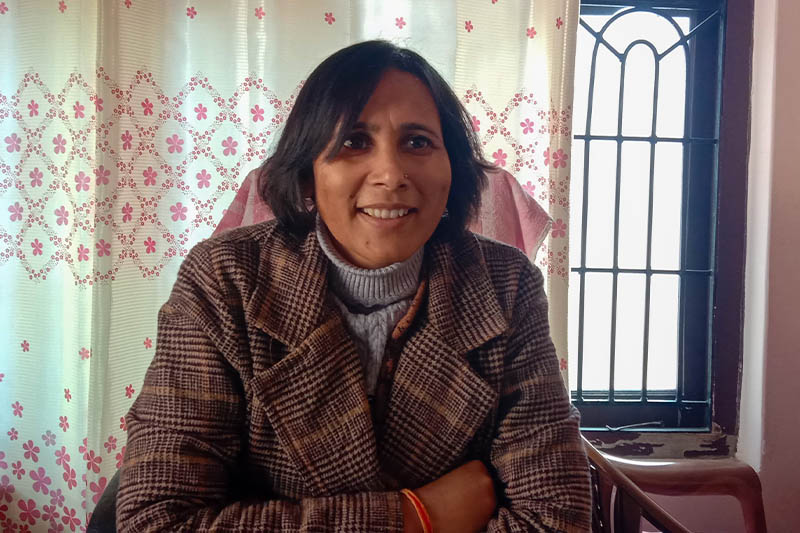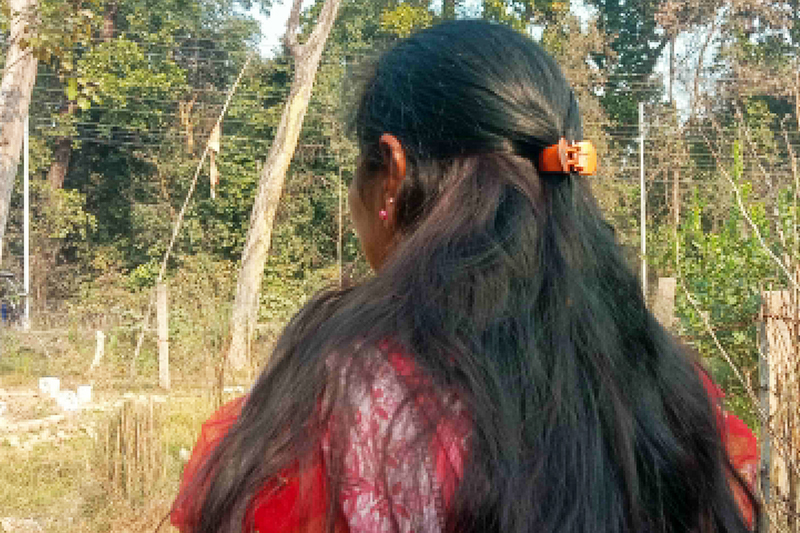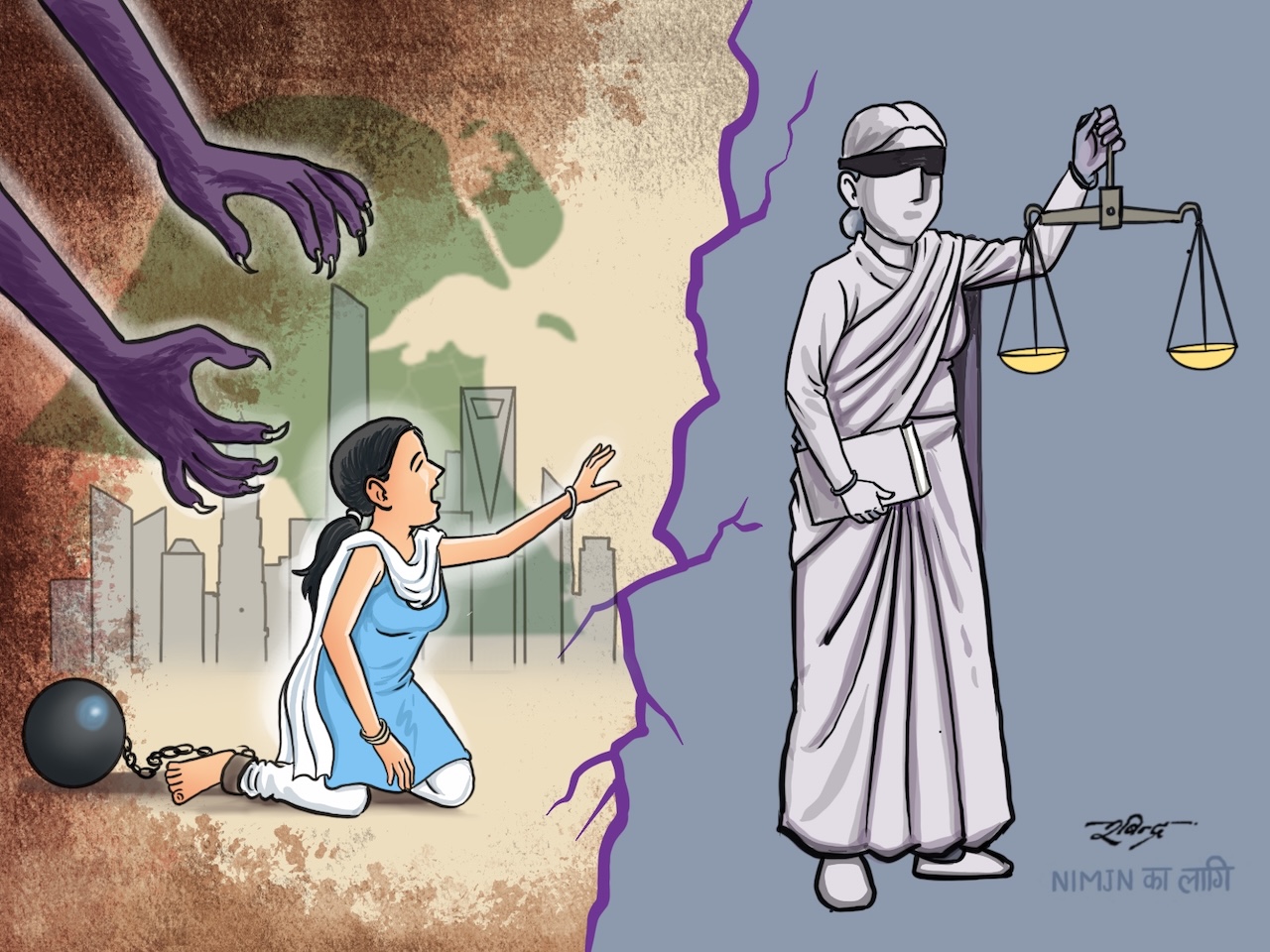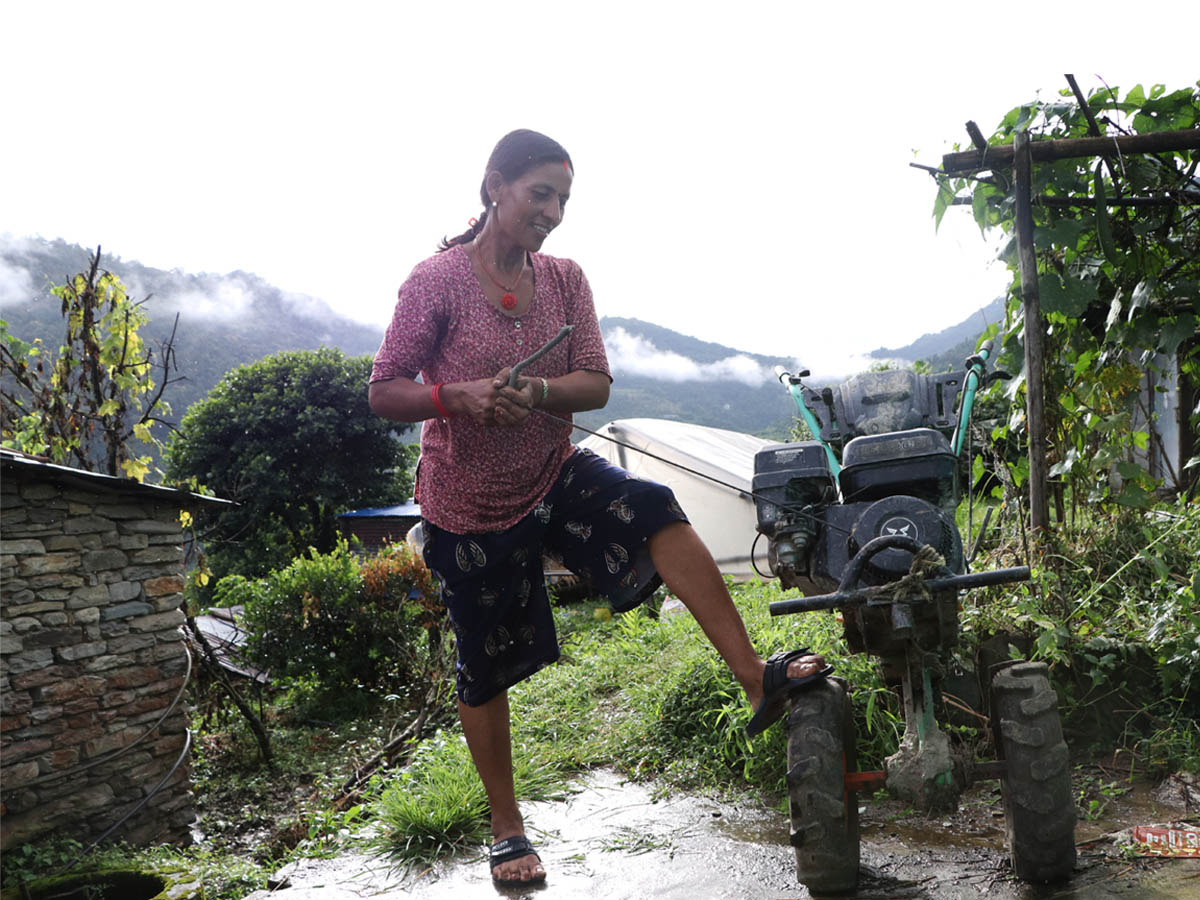Bhimdatta Municipality in Sudurpashchim Province, bordering India. The East-West Highway bisects the municipality. To the south of the highway, in the central part of the municipality, lies Ward No. 18.
 In the western area of this ward, near the sal forest, on the vacant land belonging to the Mahakali Irrigation Project, stand shelters made of thatched straw enclosed with tin sheets and tarpaulins. These shelters are home to the families of the Haliya, who were declared free laborers in 2008/2009, and the Kamlari, who were freed on July 18, 2013.
In the western area of this ward, near the sal forest, on the vacant land belonging to the Mahakali Irrigation Project, stand shelters made of thatched straw enclosed with tin sheets and tarpaulins. These shelters are home to the families of the Haliya, who were declared free laborers in 2008/2009, and the Kamlari, who were freed on July 18, 2013.
Known as Khuna Basti, the individuals from the Haliya community residing here sustain their families and manage household expenses primarily through wage labor.
Thirty families, totaling 251 individuals, reside in thirty shelters here. While there are 124 women in this settlement, the number of adolescents appears to be low. Guardians report that most adolescents from these families have gone to India to earn an income.
Although parents say they have gone to earn a living, the adolescent girls who have gone to India are found to be at risk of human trafficking and exploitation. Due to the weak financial condition of the household and the difficulty of even making ends meet, it has been found that in some cases, the parents themselves have sold their children. Pooja (name changed) is a victim of this.
Nearly 20 years ago, Pooja, following a contractor with the promise of apple picking, reached Shimla in India. She recounts experiencing exploitation, violence and abuse there. Having gone to Shimla at the age of 15, she claims that her parents took money from a contractor who came from India and sold her.
"I don't know how much money my father took from that contractor to sell me," she recalls. "My parents sent me with him after the contractor said he would give me work picking apples." At the time her parents sent her to India, they themselves were bonded laborers in someone else's home.
Sita Dangaura, the district chairperson of the Free Kamlari Development Forum, Kanchanpur, states that at that time, most adolescent girls from the Tharu community who worked as Kamlari (bonded laborers) in other people's homes were vulnerable to trafficking.
According to her, who herself worked as a Kamlari for 7 years before the government declared them free, many adolescent girls were trafficked due to the weak financial situation of their families, falling prey to the lure of money and employment, and due to illiteracy and lack of awareness. Sita mentioned that the Free Kamlari Development Forum, in coordination with Maiti Nepal, has rescued several adolescent girls who were trafficked to India.

Maheshwari Bhatta, the head of Maiti Nepal Kanchanpur, stated that when they rescue those at risk of trafficking or those who have been trafficked, they do not consider which community they belong to. Therefore, they do not keep any specific data on how many individuals from the freed Haliya-Kamaiya community have been affected.
"Firstly, it is difficult to even ascertain whether a person is from the freed Haliya-Kamaiya community or not," Maheshwari said. "Most people tend to register their last names as Tharu or Chaudhary, so we don't keep separate records." According to her, the majority of those who are trafficked come from economically disadvantaged families.
Superintendent of Police Chakra Raj Joshi of the District Police Office, Kanchanpur, stated that there has been no information in recent days about girls from the freed Haliya-Kamaiya community being trafficked. He mentioned that they conduct awareness programs to prevent trafficking, patrol and check border crossings, arrest suspicious individuals, and bring those found guilty within the purview of the law.
Taken for apple picking but forced into sex trade
For Pooja, from a Haliya-Kamaiya community family, it was very difficult to even manage two meals a day. When a contractor who came from India said it was work picking apples and that she could earn good money, she still remembers being very happy at the prospect of getting to eat apples. After reaching Shimla, she did get to eat apples. However, along with the apples, she also had to face exploitation she had never imagined in her life. "After reaching there, I did get to eat apples, but..." she trailed off, speechless.
The contractor had taken her to a brothel. There were other girls like her there as well. "Many girls like me had already been kept in the brothel by the contractor," she said. According to her, some of the girls were from Nepal, while others were from various parts of India. All of them had been gathered under the pretext of apple picking.
In the brothel, along with exploitation, she also faced physical assault and beatings. "After the contractor kept me in that brothel in Shimla, different people used to come and go every day," she says. "If I didn't obey or do as they said, they would beat me with their feet and belts." She recounts that after repeatedly enduring exploitation and abuse, she even contemplated suicide.
She says that ten years after being trapped in the brothel, she met a young Nepali man who had also come to Shimla for apple picking, fell in love with him, and then escaped back to Nepal. Living a difficult life with her husband in Nepal, her husband is also aware of her past. She mentioned that her husband sometimes brings up the past and expresses suspicion.
Young girl saved from being sold by an older girl she knew
Manisha (name changed), from the Haliya-Kamaiya community, was trafficked by a relative who was like an older sister in the year 2017/2018 at the age of 20. The eldest of five children, Manisha was more worried about the hardships of her siblings and parents than her own suffering. Therefore, she thought of going somewhere to work, earn some money, and bring happiness to her younger siblings. After learning that Manisha was looking for work, a relative who was like an older sister proposed that she go to India to work.
According to Manisha, that older sister used to tell her that she had been working in India for a long time and had earned a lot of money. Manisha said she was tempted when the older sister told her that women could earn even more money than men by going to India. She said, "After that older sister said, 'You can get the kind of work you want and they give you as much money as you ask for,' I told my parents at home that I was going to India with my relative who was like an older sister for employment."
Initially, her parents did not allow her to go to India. However, after much persistence, her parents gave Manisha permission to go. "They agreed on the sixth time after I said I would go even if I had to run away," she said.
Manisha even remembers the date, May 31, 2017, when she went to India with that older sister. "At the time of going to India, the older sister gave me 5,000 Nepali rupees in cash," she said. "When the older sister said that the money was given to her by the owner who would give me work in India, I was very happy."
She said that she started to suspect that older sister after reaching Bareilly via Banbasa. "That older sister was receiving many phone calls on the way, and after reaching Bareilly, three masked men came to pick us up," she explained her reasons for suspicion.
That older sister introduced those three people as the ones who would provide work. "All three of them were Indian, and after they talked about going with them, my feet just couldn't move forward," Manisha said.
After she hesitated to go, that older sister went to talk privately with one of the three men. After that, they pressured Manisha even more to go with them. Manisha says, "When I refused to go, the older sister started scolding me, saying, 'They have already given 5,000 rupees before work, I have brought you all the way here from home spending so much, and now you say you won't go!'"
Manisha says she felt scared and suspicious due to their harsh words. After that, she gathered her courage and said, "I won't go, if you force me, I will tell everyone." Then they stopped pressuring her, and she informed that she boarded a bus and returned home. "After that, there was no contact with that older sister," Manisha said. "If I hadn't been brave, I might have ended up in some brothel in India."
Stating that she hasn't been able to tell her family and parents about this yet, Manisha requested not to disclose the name of that older sister.
Gambling also leads to trafficking
Kusum (name changed), from the Haliya-Kamaiya community, who resides in Bhagatpur, Bhimdatta Municipality-18, Kanchanpur, says that her father sold her for money to buy alcohol and gamble. "When I was 7 years old, my father sold me in a gambling game," she said. "When I grew older, I ran away from the place where my father had sold me."

She informed that as she grew older, she understood everything and ran away. She stated that when she escaped from India, where she had been sold, her father had already passed away.
She recounts that she was taken to India to do household work and suffered a lot. "I suffered greatly," Kusum said. "Because of my father, my entire childhood was spent in darkness."
She says that even now, remembering that difficult time she spent in other people's homes at a young age causes her immense pain. She stated, "That exploitation I faced at that tender age was like death for me."
After HIV infection, they are expelled from the brothel itself
Bimala (name changed), 39 years old, who has been residing on the town development land of Bhimdatta Municipality-18 in Kanchanpur, was expelled from a brothel in Shimla on August 12, 2006.
She stated that after being diagnosed with HIV/AIDS, she was given 20,000 Indian rupees and sent home from the brothel. Women who have stayed in the brothel for a long time and are getting old are made to do tasks like sweeping, mopping, washing dishes and doing laundry. When they become sick or ill, they are given a little money and expelled from the brothel itself.
Bimala recounts that her own father sold her and her two sisters when she was 18 years old. She stated that her father sent them to Shimla with three individuals who came from India, saying it was for work picking peas. However, she narrated that those individuals took them to a brothel in Shimla.
She stated that after arriving at the brothel, she learned that her father had sold his three daughters for 33,000 Nepali rupees. Bimala said that although they were initially in the same brothel with her sisters, the brothel operator later sent them elsewhere.
Bimala recounts that despite trying to escape, she was unable to and was forced to stay in the brothel for a long time. She says, "There was a woman in the brothel whom everyone used to call Thakurain. Every person had to act according to the orders she gave. Just seeing her from afar would make you feel scared."
(This investigative report was prepared through the NIMJN fellowship supported by the Australian Aid. All rights reserved with the author and publisher.)
Please adhere to our republishing policy if you'd like to republish this story. You can find the guidelines here.



